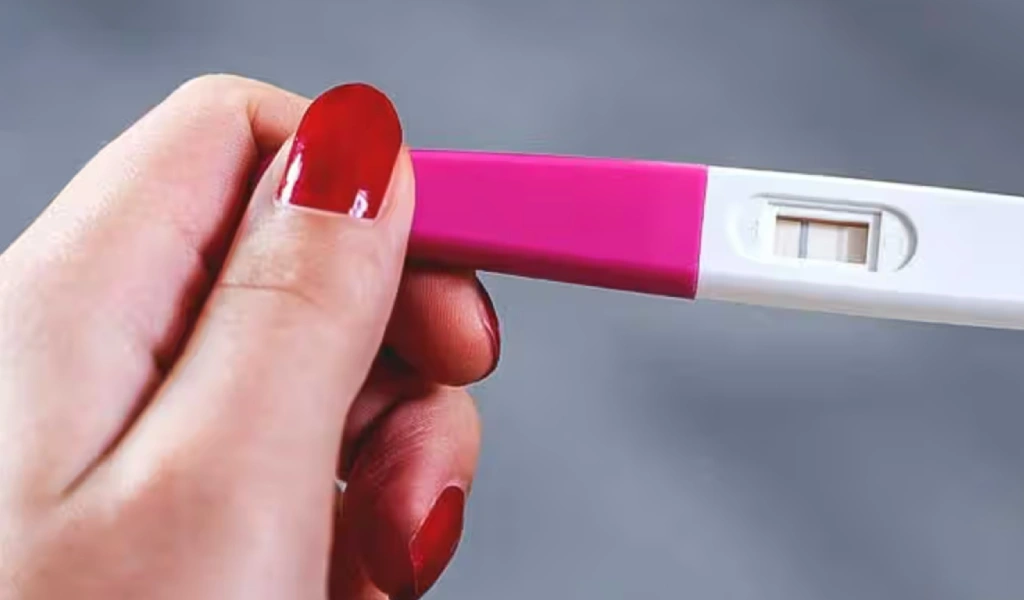HCG Blood Pregnancy Test can spot the existence of the HCG hormone (which is discharged after implantation) with dependable precision.1
Human chorionic gonadotropin (hCG), a hormone mainly made by the placenta, is examined in blood and urine to identify pregnancy. The blood test for hCG during pregnancy can show pregnancy symptoms earlier than a week before your period. This is possible because hCG levels can be detected in the blood as soon as six days after embryo implantation.2
The highest levels of hCG are typically reached between the first 14 to 16 weeks following the last menstrual period. Following this period, the hCG levels begin to decrease and then remain steady throughout the remainder of the pregnancy.
Explore this post ‘What Is HCG Blood Pregnancy Test?‘ to learn more about the hCG blood pregnancy test, including information on when to undergo the test, methods for interpreting the results, and the reliability of the hCG blood pregnancy test.
What Is the HCG Blood Pregnancy Test?
Blood tests for hCG are used to identify the hCG hormone in the blood, providing certainty in confirming pregnancy. These tests can only be done at a medical facility.
The two types of hCG blood pregnancy tests that you might have to take include:
- Qualitative hCG blood pregnancy test: It tests for the existence of hCG in your bloodstream and provides a positive or negative outcome.
- Quantitative hCG blood pregnancy test: It examines the concentration of hCG in the blood. This can help determine the exact gestational age of the fetus or detect issues such as miscarriage or ectopic pregnancy when the embryo attaches outside the womb. It is also useful for monitoring individuals with molar pregnancies and gestational trophoblastic disease.3
Other ways of describing a quantitative hCG blood test include the following:
- Beta hCG blood test
- Repeat quantitative beta-hCG test
- Quantitative serial beta-hCG test
- Quantitative blood pregnancy test
When is it possible for a quantitative hCG test to determine if a woman is pregnant?
An hCG blood pregnancy test can identify an early pregnancy within six to eight days after the embryo is implanted. This implies that pregnancy can be detected ten days to a week before the expected period date.
How Reliable is the hCG Blood Pregnancy Test?
Blood tests are approximately 99% accurate.
In rare instances, they may provide incorrect results, either false positives or false negatives. A small blood sample is sufficient to determine the levels of hCG hormone present. Comparatively, a blood hCG test is more dependable than a urine pregnancy test in detecting low levels of hCG and identifying pregnancy at an earlier stage.
Possible factors that may influence the results of a hCG blood pregnancy test include.
- Fertility drugs and injections, as well as certain tumors (such as germ cell tumors), molar pregnancy, and gestational trophoblastic disease, can contribute to infertility.
- Multiple pregnancies, including twins or triplets, can also affect fertility.
- Recent pregnancy loss may also impact a person’s ability to conceive.
What is the purpose of an hCG blood pregnancy test?
An hCG blood pregnancy test is typically performed for the following purposes.
- To ascertain if someone is pregnant.
- To determine the age of the fetus.
- To identify abnormal pregnancies like molar and ectopic pregnancies.
- To detect signs of a potential miscarriage.
- As a screening measure for Down syndrome.
- To diagnose abnormal conditions, like ovarian tumors, in non-pregnant individuals.4
What are the other factors that may lead to the need for a beta hCG blood test?
hCG is recognized as a marker for tumors because it can be found in certain cancer types.5 The circumstances where the hCG hormone is expected to be detected are.
- Ovarian and uterine cancers
- Trophoblastic tumors
- Molar pregnancy
- Testicular cancer (in men)6
Elevated hCG levels are also detected in lung, liver, stomach, and pancreas cancers.
How is the beta-hCG test conducted?
The exam is comparable to a standard blood test. Only a small sample of blood is needed, taken from the arm vein through venipuncture, and there is no need for any specific arrangements beforehand. Nonetheless, it is important to notify your doctor of any medications, herbal remedies, dietary supplements, or homeopathic treatments you are currently using, as they could impact the test results.
The examination includes the subsequent procedures:
- The phlebotomist, a technician responsible for collecting blood samples, places a stretchable band around the upper arm to make the veins more visible by causing them to swell.
- The part of the body where the vein is visible and the area around it is sanitized using an antiseptic solution.
- A needle is carefully placed into the vein to collect a blood sample in a vial.
- The rubber band and the needle have been taken out.
- The area is protected with a cotton gauze or adhesive bandage to prevent excess bleeding.
- The sample of blood is forwarded to the lab for examination.
Are there any dangers associated with undergoing an hCG blood pregnancy test?
There are unlikely to be any significant dangers associated with an hCG test. The consequences could be temporary. A few of these include:
- Discomfort or a sharp feeling in the area where the needle was inserted.
- Feeling dizzy or faint.
- Blood pooling under the skin (bruising).
- There is a possibility of contracting an infection if the skin is punctured.
How to interpret the results of a hCG blood test?
In a qualitative beta hCG test
- A positive outcome suggests that you are pregnant or have been pregnant recently.
- A negative outcome suggests that you are not pregnant or that the test was conducted too early.
In a quantitative beta hCG test
The outcome is presented as a numerical value (measured in milli-international units per milliliter – mIU/mL) which shows the amount of hCG hormone in the bloodstream. These levels increase quickly in the initial three months of pregnancy before decreasing and stabilizing for the remainder of the gestation period.
The levels might differ based on how far along you are in your pregnancy. Your physician can clarify the significance of the particular levels during your pregnancy.
In a woman who is not pregnant, the levels would be below 3mIU/mL.
| WEEKS AFTER THE LAST MENSTRUAL PERIOD | NORMAL HCG RANGE (MIU/ML) |
|---|---|
| 3 | 5 – 72 |
| 4 | 10 – 708 |
| 5 | 217 – 8,245 |
| 6 | 152 – 32,177 |
| 7 | 4,059 – 153,767 |
| 8 | 31,366 – 149,094 |
| 9 | 59,109 – 135,901 |
| 10 | 44,186 – 170,409 |
| 12 | 27,107 – 201,165 |
| 14 | 24,302 – 93,646 |
| 15 | 12,540 – 69,747 |
| 16 | 8,904 – 55,332 |
| 17 | 8,240 – 51,793 |
| 18 | 9,649 – 55,271 |
Your healthcare professional will assist you in understanding the outcome.
Having a higher hCG level than normal could indicate the following:
- Multiple pregnancies (such as twins or triplets)
- Uterine choriocarcinomasi
- Hydatidiform mole or molar pregnancy
- Ovarian cancer
If the hCG level is below the normal range, it could indicate any of the following:
- Incomplete miscarriage
- Fetal death
- Ectopic pregnancy
hCG Blood Test Results: False Positives And False Negatives
False results can potentially be obtained from an hCG test, which resembles urine or at-home pregnancy tests.
- False-positive pregnancy test result: Even if you are not pregnant, the test may still indicate a positive result. If you are taking medications or injections that contain hCG, like those used in fertility treatments or have specific cancers, you could receive a false-positive result.
- False-negative pregnancy test result: In this instance, the result of the test indicates a negative result, even though you are pregnant. This situation can occur if the test is done too soon before the body produces a sufficient amount of hCG in the bloodstream. Taking medications or engaging in harmful behaviors like smoking or drinking alcohol could also lead to a false-negative test outcome.
If the result of the test is negative and you believe you may be pregnant, the doctor may suggest repeating the test after a few days
Although the hCG urine test is a common method used in self-administered pregnancy tests, the hCG blood test can detect pregnancy at an earlier stage than its urine counterpart. Two categories of hCG blood tests exist: qualitative and quantitative. The former establishes the existence of hCG in the bloodstream, while the latter determines the age of the fetus and identifies potential pregnancy complications.
Diverse factors such as fertility treatments, germ cell tumors, molar pregnancies, and other medical conditions have the potential to impact the outcomes of an hCG blood test. It is recommended to seek advice from a healthcare professional if there are concerns about early pregnancy detection, prior miscarriages, or suspicions of fetal abnormalities.
Key Pointers of ‘What Is HCG Blood Pregnancy Test?’
- A pregnancy blood test for hCG can be done six to eight days after implantation and comes in two forms: qualitative and quantitative.
- A qualitative test provides either a positive or negative outcome, while a quantitative test offers numerical results that show the levels of hCG in the blood.
- The outcomes may be affected by various factors like continuous use of medication, existing health conditions, or a recent miscarriage.























